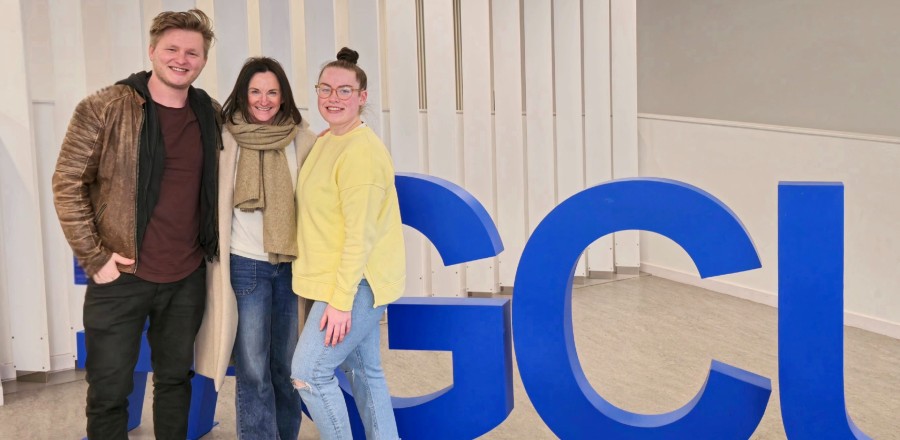Students sharpen health and care knowledge in school of real life

South Lanarkshire Health and Social Care Partnership (HSCP) has recently hosted three students as part of a wider collaboration exploring innovation in health and care.
Dabbi Taylor, Susie Ligertwood, and Georgia Callander, all BSc and MSc pre-registration Occupational Therapy (OT) students at Glasgow Caledonian University, set out to evaluate an international method of goal setting for patients, locally.
The placement follows health and social care services in Lanarkshire recently formalising an ambitious partnership with Glasgow Caledonian with the aim of transforming lives across the area – and beyond.
“In practical terms, and as this recent work attests, our close collaboration with Glasgow Caledonian allows us to equip our health and care professionals of tomorrow with real-world experience, today” said Professor Soumen Sengupta, Chief Officer of South Lanarkshire HSCP.
“Similarly, this also provides the students with opportunity to test and assess innovative ways of delivering health and care in a real-world environment, safely, effectively, and with the support of experienced professionals.”
Occupational therapists are healthcare professionals who help people of all ages who have physical, sensory, or cognitive problems. OT can help people to do the things they want to, or need to do in their lives. Occupational therapists help with barriers that affect a person's emotional, cognitive, social, and physical needs.
NHS Lanarkshire’s Lynsey McKee, OT Team Lead and Fiona Black, Specialist Occupational Therapist – both from Clydesdale & Stonehouse Community Hospitals, hosted the students – focusing their efforts on supporting older people.
Lynsey explained: “We know people can often face complex challenges as they grow older, dealing with factors such as acute illness, multi-morbidity, increased fall risks, and social isolation. We have many robust methods to support and help them navigate these challenges - and the work of the students provided a practical insight into an alternative method of goal setting to underpin assessment, rehabilitation and discharge planning.
“As aspiring OTs, the team showed great commitment in exploring the challenge of applying a goal-setting process with older people.
“Among various learning points, it became quickly apparent to the students that considering a person holistically, all their physically and psychological requirements, is essential to the recovery process.”
Lynsey added: “I’d like to thank Dabbi, Susie and Georgia for all their dedication and compassion. There is no doubt they will go on to make a positive difference to the lives of many people in their future careers.”
Speaking on behalf of the students, Dabbi Taylor added: “Working with real patients and their carers, learning about their hopes, fears has given us all immense insight into the real-world impact the OT profession can have.
“Delivering health care isn’t without its challenges – but being able to assess and apply methodology outside of the lecture theatre, and in Lanarkshire, has been immensely enriching. It has only renewed our drive to pursue a career in OT.”
Dr Alexandra Mavroeidi, Glasgow Caledonian University Head of Occupational Therapy and Human Nutrition and Dietetics in the School of Health and Life Sciences, said: “At Glasgow Caledonian we are proud to produce graduates who are fit for award, fit for practice and fit for purpose.
“Diverse practice-based education opportunities, offered in collaboration with our strategic partners, are key to that process.”
She said partnerships like this “give our graduates a strong professional identity, ability to work collaboratively and inter-professionally with the potential to experience real word occupational therapy practices, while they still study with us”.
Dr Mavroeidi added: “They set them up to becoming highly-skilled and competent OTs who are flexible, creative, and able to initiate, manage and respond to change and thus, have a real-world impact in the OT profession and workforce.”
Students hone focus on patient goal setting.
During their 12-week placement, the students set out to evaluate the effectiveness of a system called the Canadian Occupational Performance Measure (COPM). A primary aim of COPM is to allow people to identify and prioritise everyday issues that restrict their participation in everyday living – including self-care, leisure, and productivity – so steps can be taken to address barriers. COPM is used internationally with people of all ages – although the students focused on older people in their work in Lanarkshire.
In their findings, Dabbi Taylor emphasised the importance of ongoing introspection from patients to allow them to set meaningful and realistic goals during their recovery journey. Georgia Callander observed that COPM goal setting served as a motivational driver during recovery. Susie Ligertwood emphasised the crucial role of the community health and care support, such as South Lanarkshire HSCP’s Integrated Community Support Team, in post-hospital goal achievement.
